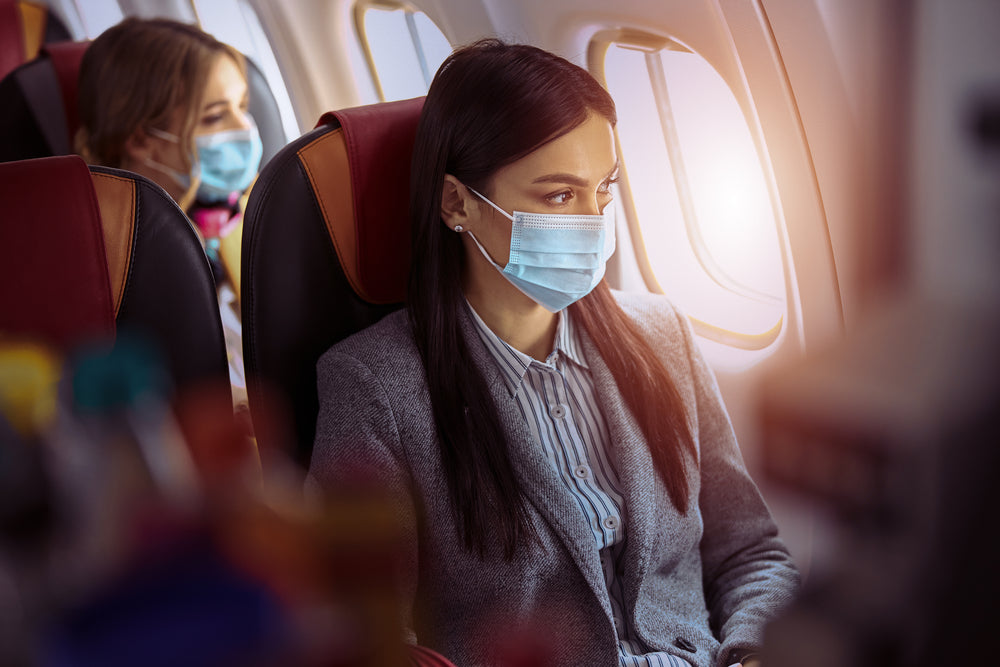Free U.S. Shipping On Orders Over $150

Planes Are Full of Germs: Here's How to Stay Safe
Posted on
You probably already suspected it and you are right — planes are full of germs. And according to an article in the Washington Post, they have actually gotten dirtier as airlines have relaxed their thorough covid-era cleaning standards.
So keep that mask on and remember to sanitize your hands often. This is especially important if you travel often or have a health problem that leaves you vulnerable to germs.
Which Are The Dirtiest Places in a Plane?
Surfaces that almost everyone in the plane comes into contact with tend to be the dirtiest. These include the tray tables, bathroom door latches, and seatback pockets.
What about the air? This is not as bad since many airlines these days have HEPA filters that are extremely effective at removing bacteria and allergens from the air. Still, these are typically only turned on once you are in the air, so airborne germs can spread while you are on the ground. And don’t forget that the airports themselves can be crowded and full of airborne bugs.
How to Stay Healthy When Flying
There are two main threats to your health when flying: dirty surfaces and airborne germs. Here are the best ways to protect yourself and ensure you get back home healthy.
1. Wear a Mask, Even if It’s Not Required
Airlines now do not require passengers to wear masks. While the worst of Covid may be over, there are many other bugs lurking in the air both in airports and inside planes.
So we recommend still wearing your mask whenever you fly. Look for a comfortable mask that you can keep on for hours without any discomfort or skin problems. We recommend the anti-acne Hercleon flight face mask. It straps around your head, so it doesn't pull on your ears and it’s designed to prevent skin breakouts that are common with most other masks.
By the way, a mask is not just good for protecting you against bugs; it’s also helpful if you are allergic to dust, pollen, mold spores or anything airborne. Yes, there are allergens in airplanes. We have a helpful guide on how to travel safely with allergies.
2. Carry a Small Sanitizer With Your Everywhere
There are plenty of icky surfaces on an airplane that are touched by many people or are not cleaned often (e.g. seat pockets). If you touch these germ-filled surfaces then touch your mouth or nose, you could catch a nasty bug. Touching your face also risks acne breakouts.
Because you cannot completely avoid these surfaces, the best protection is sanitizing your hands regularly when at the airport and in the airplane. It is especially important to sanitize before you eat, drink, touch your face (e.g. when applying moisturizer) or hold a baby.
3. Be Extra Careful About High-risk Areas
We are not saying that you should be an obsessive germaphobe, but it’s worth it to be extra careful around high-risk areas in an airplane. Here are some precautions you can take to protect yourself.
- Carry a pack of antibacterial wipes and wipe down the tray table. It is one of the dirtiest places on an airplane. Also, a lot of people change diapers on the tray table.
- Always wash your hands with soap and water after you’ve used the bathroom. Alternatively, use a sanitizer.
- Do not put anything in the seat pockets as they are some of the dirtiest places. They are cleared of trash but never really cleaned. Keep your phone, tablet or anything else out of them.
4. Hydrate and Then Hydrate Some More
It’s impossible to fully avoid coming into contact with the myriad of germs in an airplane. But that’s fine since your body can fight off the ones that find a way inside you. A strong immune system greatly increases your chances of avoiding an infection.
One of the ways of supporting your immune system, and your entire body, is hydrating. This is especially important in an airplane since the humidity is usually low. So you can quickly get dehydrated. Drink lots of water before boarding and keep hydrating during your flight.
Pack an empty refillable water bottle and once you are through security, fill it with drinking water. Hydrating will also help fight off jet lag on long haul flights.
5. Get Plenty of Rest Before and During Travel
The other thing you can do to support your immune system is resting. Traveling is stressful on the body and can leave you more vulnerable to disease-causing bugs. Get good sleep leading up to your trip and make sure you rest up during the flight, if it’s a long one.
Carry an eye mask and noise-canceling headphones to help you take a nap.
Quick links
Contact
6063 Hudson Road #160
Woodbury, MN 55125
Yo@hercLeon.com
Leave a comment: